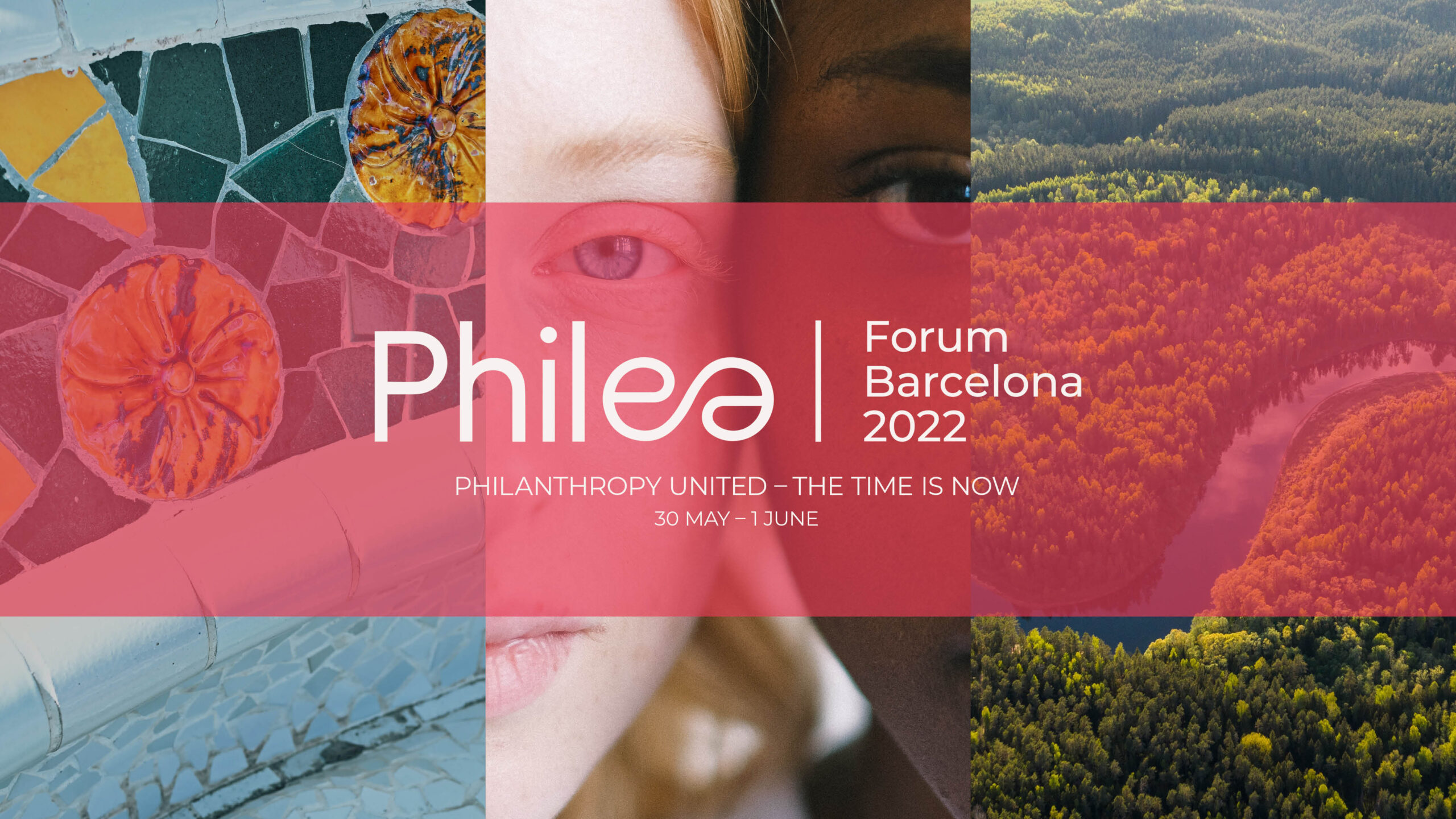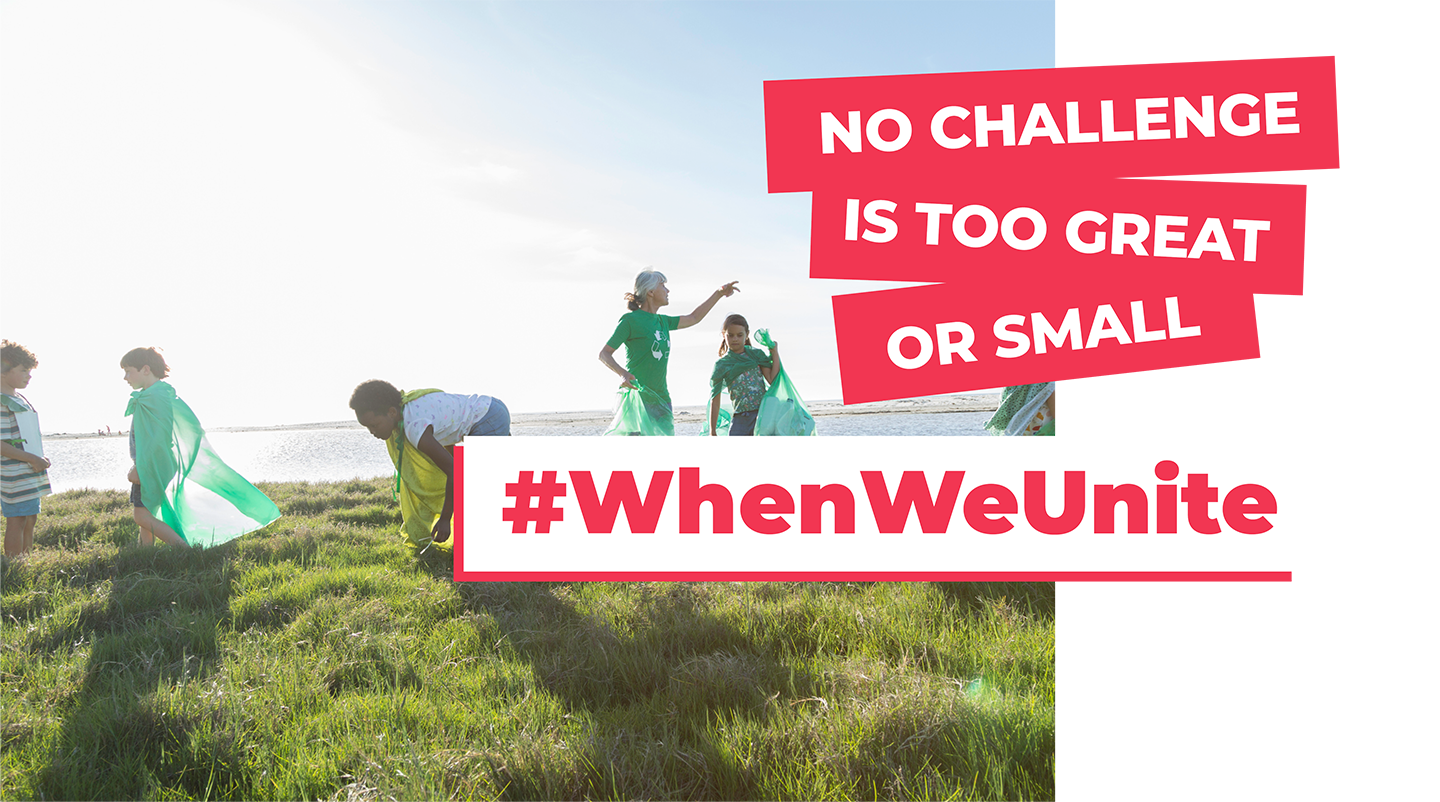Philea Forum 2022
Against the backdrop of the humanitarian crisis in Ukraine, and with just 8 years remaining to meet the targets set by the 2030 Agenda for Sustainable Development, more than 700 philanthropy professionals gathered from 30 May to 1 June 2022 in Barcelona for the first-ever Philea Forum, “Philanthropy United – The Time Is Now”, hosted by Philea member “la Caixa” Foundation.
The symbiotic nature of the relationships among climate, health, human rights, conflict, democracy and equality – areas where we are facing our biggest challenges as a global society – emerged as the main thread running through the conference. Along with this, the conference emphasised the critical importance of philanthropy engaging in multi-stakeholder partnerships in order to take a systemic and comprehensive approach to these challenges.
Throughout the sessions, delegates pointed to the unique role for philanthropy in creating spaces for dialogue and understanding with citizens – and especially with youth – leading to novel channels for engagement of people in their societies. Resurrecting the voice of citizens was seen as key to finding solutions to the interconnected issues philanthropy and governments are wrestling with.
The Host Committee of the Philea Forum worked with Philea’s Disability Thematic Network, and in particular with Fundación ONCE, to meet key accessibility standards for this conference.
The Forum was the first to be organised as a “converged” event, involving foundations and national associations alike. In this new context, the diverse European philanthropic landscape retains its distinct role – as a catalyst for change and builder of bridges between communities, sectors and generations, connecting learnings of yesterday with aspirations for tomorrow. Furthermore, as 2022 marks the European Year of Youth, the Forum will engage participants in a conversation around three overlapping strands, while ensuring the voice of and focus on young people remains a constant throughout:
Opening Plenary
The symbiosis of global challenges
The conference kicked off with welcome remarks from Antonio Vila Bertrán, Director General of “la Caixa” Foundation, followed by a panel discussion focusing on the interconnected nature of the challenges facing us, and the holistic approach needed to tackle them. Philea CEO Delphine Moralis moderated the panel, which featured:
- Joe Elborn, Secretary General of the European Youth Forum
- Michael O’Flaherty, Director of the European Union Agency for Fundamental Rights
- Leonardo Santos Simão, Former Minister of Foreign Affairs and Cooperation of Mozambique and EDCTP – African High Advisor
- Laurence Tubiana, CEO of the European Climate Foundation
Key points from the panel included the following:
- The symbiotic relationships among climate, health, human rights, conflict, and equality – areas where we are facing our biggest challenges as a global society – was the main theme running through the Opening Plenary. In a pre-conference survey, 500 delegates agreed that interconnecting the areas in which philanthropy works is critical to finding successful solutions to today’s challenges. Crucially, they emphasised the need for continued multi-stakeholder partnerships to make this happen.
- There are no shortcuts, no silver bullets to solve the challenges we face. There has to be an interconnected, comprehensive approach.
- Hope is key – philanthropy needs to harness evidence-based hope to counter helplessness in citizens and inspire them to engage.
- Citizens are frustrated, with a lack of spaces for them to express themselves and to engage
- The erosion of trust in our institutions, especially among youth, is leading to an erosion in democracy. But without democracy, we cannot hope to tackle the challenges that are before us, such as climate change and rising inequality. This is an urgent are of action for philanthropy.
- A key role for philanthropy is creating spaces for dialogue and understanding with citizens, with youth., leading to novel channels for true engagement of citizens in their societies.
- Creating dialogue around culture and using the arts as an entry point for engagement are effective ways for philanthropy to seed solutions.
- We need to hear the voices of those most affected by these crises.
- We must emphasise that the role of philanthropy is not to fill funding gaps: Philanthropy’s role is to point out the gaps, to think systemically, to advocate for solutions.
- Climate change has emerged as a key area where diverse partners can engage together, despite disagreements/antagonism in other areas.
Philanthropy for Ukraine, philanthropy in Ukraine
Following this first discussion, the plenary zoomed in on the war in Ukraine, with Philea members from the country sharing stories of what they are facing, both as individuals and as civil society actors, and how the resilience and solidarity of the Ukrainian people have emerged as a crucial factor in this situation. The panel featured:
- Eugenia Mazurenko, CEO of the Zagoriy Foundation
- Inna Pidluska, Deputy Executive Director of the International Renaissance Foundation
Key points from this discussion included the following:
- The war in Ukraine is a challenge to the entire world order.
- The solidarity and tremendous demonstration of unity and resilience of the Ukrainian people gives us evidence-based hope.
- It is crucial that humanitarian aid – “smart” aid – encompasses long-term strategies for recovery and re-building, and not just immediate needs, and that it invests in human capital and supports institutions that are still operating such as education and health systems.
- Solidarity means not just giving a home to refugees, but engaging with civil society them through civil society in partnerships and initiatives.
- The people in Ukraine may not express it as such, but they are indeed fighting for democracy, and this has inspired governments from around the world to support them.
- Civil society organisations and foundations continued their operations and work throughout the conflict. They adjusted as needed, but continued working, also on the usual issues that they have always worked on. These issues (e.g. caring for the elderly, people in poverty) did not go away when the war came. The war just made them more complex to deal with.
- Citizens are creating funds as needed, truly local initiatives among neighbours and friends to raise funds to buy supplies, cars, etc. – a testament to solidarity and resilience.
At the end of the panel discussion, Eugenia Mazurenko presented Philea with a porcelain rooster that had survived unscathed in the kitchen of a Kyiv home, when all around it had been destroyed by shelling. Delphine Moralis accepted the gift, saying it would serve as a reminder of the resilience of the Ukrainian people, and thus as inspiration for the work of Philea and all of its members.
This panel underlined Philea members’ strong commitment to support Ukraine and those affected by the war. Soon after the war began, Philea, with key partners from the philanthropy sector launched the integrated online portals PhilanthropyForUkraine.eu and NGOforUkraine.eu to better coordinate the efforts, initiatives and calls for donations from the European philanthropy sector and NGO community in Ukraine and neighbouring countries.
Keynote: António Vitorino, Head of the United Nations International Organization for Migration
The plenary wrapped up with a keynote speech from António Vitorino, Head of the United Nations International Organization for Migration. Key points included the following:
- The support of philanthropy and civil society in these situations is critical. We rely on the knowledge, networks and expertise of philanthropy and civil society, in all the areas that we work in. The engagement of philanthropy and civil society is becoming more and more important.
- We need philanthropy to be the oil in the machinery of partnership, bringing people together, all actors together. We need philanthropy to increase the voice of participation of civil society in national and multilateral discussions.
- The speed of the displacement in Ukraine was intense, but so was the reaction of European governments and citizens.
- The long-term recovery will be difficult. Philanthropy is needed more than ever.
- Unfortunately, Ukraine is not the only area of conflict in the world. Many more people across the globe are being affected by war and are on the move, and the patterns of displacement are constantly changing, making it even more challenging to deal with.
Watch the livestream recording of the Opening Plenary
Closing plenary
The closing session focused on two central themes:
- Climate and health: With new, open, scientific knowledge from various disciplines, as well as coordinated action between different sectors, how can philanthropy support this collaboration and best help mitigate challenges such as the climate emergency, food security and global health which are so intrinsically linked?
- Inequality: In the face of so many complex inequalities, how can we continue to move forward towards a more equal society, and how can philanthropy contribute to building resilience in the face of aggravated inequalities in the context of the Covid-19 and more recently the war in Ukraine?
Ignasi López Verdeguer, Director of the Department Research and Innovation at “la Caixa” Foundation, opened the session, noting the urgency reflected in the title of the conference, and said that although the challenges are tough, he sensed the unity of the sector at the conference, which gives hope.
Contribution by Soumya Swaminathan, Chief Scientist of WHO
Joining the session through a pre-recorded video, Soumya Swaminathan, Chief Scientist at the World Health Organization, pointed out that we are at about the midpoint for the Sustainable Development Goals, and countries around the world have fallen behind on their commitments around the SDGs. What has become clear during the pandemic is the centrality of health as a precondition for development, security, and the need for health equity, human rights.
With this in mind, WHO is aiming for countries to reposition health as part of the national development agenda, emphasising the need to connect the planet’s people, prosperity and equity, and also connect with animal health to what WHO calls the “one health approach”. Ms. Swaminathan stressed that philanthropy is a key element in these agendas. To meet all of these goals, governments, international institutions and civil society must work together.
Panel discussion: Climate, health and inequality
Moderated by Ignasi López Verdeguer, this panel included the following speakers:
- Neil Heslop, Chief Executive Officer, Charities Aid Foundation
- Carla Haddad Mardini, Director, Private Fundraising and Partnerships United Nations Children’s Fund
- Octavi Quintana Trias, Director, PRIMA – Partnership for Research & Innovation in the Mediterranean Area
- Jo Swinson, Director, Partners for a New Economy
Speakers stressed the following points:
- The looming food crisis is a huge issue that we need to grapple with now. This will touch every area philanthropy works in.
- The effects of climate change will be orders of magnitude larger than those of the pandemic.
- Regarding climate change, Europe should turn its eyes to the south for solutions where the potential for wind and solar energy is enormous.
- We have to think our way into a new way of acting but also have to act our way into a new way of thinking.
- Human values and human rights are the bedrock of solutions.
- Our economic system should be helping to solve these problems, but instead it is making them worse. Our economy is designed to be extractive of people and nature. In our system, people are represented as labour, not as people. We need to fundamentally change the way we think about economics. People have designed the economy as it is now, people can also change it. (See Kate Raworth, “Doughnut Economics: Seven ways to think like a 21st century economist”)
- Covid brought tectonic shifts in the behaviour of the private sector: The corporate sector stepped up in unprecedented ways by deploying their core assets to address the problem. Philanthropy responded as well in many ways, both in the short and long term. An example of a long-term contribution is the decades-long funding of research that helped lead to Covid vaccines.
- Philanthropy has the advantage of not being weighed down by bureaucracy in the way large international organisations can be, allowing philanthropy to create alliances quickly.
- Talent is everywhere, opportunity is not. A challenge for our sector is how to extend opportunity to all.
- Speed matters, and as we work to solve problems, it will not be comfortable. If it is, then we are not doing it fast or far enough.
- We need to leverage the power of the private sector, business, philanthropy and individuals.
- We need to have value-driven partnerships, not just transactional ones.
- The problems we face are interconnected, so the solutions should be interconnected as well. A holistic approach is key.
Keynote: Javier Solana, President of the Scientific Committee, “la Caixa” Foundation
Next delegates heard a keynote speech from Javier Solana, President of the Scientific Committee, “la Caixa” Foundation. He focused on Ukraine, stressing the following points:
- The EU is absolutely committed to Ukraine, not just the institutions but the people of Europe. The EU has never acted with such solidarity before. This is very important for Ukraine but also for Europe.
- To wind this battle, we need solidarity. These fights are not won only militarily, they have to be won with the conviction of people. And for that we need organisations like the ones represented at this conference.
- “Non-state actors are very important to make this world a better place. I think we together can give a small example of how the world can be a better place.”
Hearing from youth
Ignasi López Verdeguer invited two young activists from Mexico, Mariana Reyes and Adam Neda, to talk about how they had experienced the conference. Both said they felt heard by the foundations they met. They asked delegates at the closing session to rethink how they work with young people: Instead of trying to find ways to bring young people into foundations’ usual way of working, philanthropy and young people together need to build new spaces for collaboration and mutual learning.
Wrap-up
Angel Font, Corporate Director of Research and Health at “la Caixa” Foundation and President of Philea’s Board, wrapped up the conference by thanking all of those involved in making the conference happen, and he thanked the members of Philea for bringing their ideas and enthusiasm to the event.
He also announced the launch of the #WhenWeUnite campaign, designed to showcase the diversity and breadth of philanthropic work across Europe, and the sector’s potential to play a key role in tackling the challenges the world faces.
To lead participants into next year, Cvjetana Plavša-Matić, Director of Croatia Foundation Forum, introduced the 2023 Forum with a video that gave a taste of what the next conference has in store. The Philea Forum 2023 will take place in Šibenik, Croatia from 23-25 May.
Watch the livestream recording of the Closing Plenary
#WhenWeUnite
Philanthropy is everywhere around us. It brings real value – to individuals, communities, societies – in more ways than we even know. From one-off contributions, to major donors, to a few hours of someone’s time, together we can collaborate to improve our societies.
Contact





